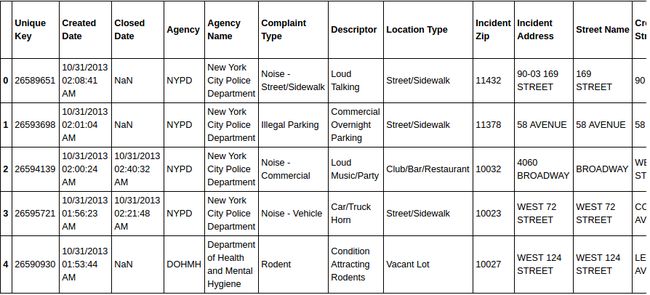Python基础篇—Pandas应用(一)
下面结合一个具体案例进一步了解pandas的应用。参考文章pandas-cookbook GitHub repository
在此,我们将利用一个新的数据集来演示如何用pandas处理更大的数据集。通过分析该数据集,找到最常见的投诉类型(数据可在GitHub上下载)。
导入数据
首先来导入相关的库,并设置好参数:
# The usual preamble
%matplotlib inline
import pandas as pd
import matplotlib.pyplot as plt
# Make the graphs a bit prettier, and bigger
pd.set_option('display.mpl_style', 'default')
# This is necessary to show lots of columns in pandas 0.12.
# Not necessary in pandas 0.13.
pd.set_option('display.width', 5000)
pd.set_option('display.max_columns', 60)
plt.rcParams['figure.figsize'] = (15, 5)导入并查看数据。由于数据量较大,我们不可能显示出所有数据,但可查看部分数据:
complaints = pd.read_csv(u'/home/hadoop/下载/pandas-cookbook-master/data/311-service-requests.csv')
complaints.head(5)#显示前5行数据选择行和列
比如我们要选择出Complaint Type这一列,通过下面命令来选择:
complaints['Complaint Type']输出:
0 Noise - Street/Sidewalk
1 Illegal Parking
2 Noise - Commercial
3 Noise - Vehicle
4 Rodent
5 Noise - Commercial
6 Blocked Driveway
7 Noise - Commercial
8 Noise - Commercial
9 Noise - Commercial
10 Noise - House of Worship
11 Noise - Commercial
12 Illegal Parking
13 Noise - Vehicle
14 Rodent
15 Noise - House of Worship
16 Noise - Street/Sidewalk
17 Illegal Parking
18 Street Light Condition
19 Noise - Commercial
20 Noise - House of Worship
21 Noise - Commercial
22 Noise - Vehicle
23 Noise - Commercial
24 Blocked Driveway
25 Noise - Street/Sidewalk
26 Street Light Condition
27 Harboring Bees/Wasps
28 Noise - Street/Sidewalk
29 Street Light Condition
...
111039 Noise - Commercial
111040 Noise - Commercial
111041 Noise
111042 Noise - Street/Sidewalk
111043 Noise - Commercial
111044 Noise - Street/Sidewalk
111045 Water System
111046 Noise
111047 Illegal Parking
111048 Noise - Street/Sidewalk
111049 Noise - Commercial
111050 Noise
111051 Noise - Commercial
111052 Water System
111053 Derelict Vehicles
111054 Noise - Street/Sidewalk
111055 Noise - Commercial
111056 Street Sign - Missing
111057 Noise
111058 Noise - Commercial
111059 Noise - Street/Sidewalk
111060 Noise
111061 Noise - Commercial
111062 Water System
111063 Water System
111064 Maintenance or Facility
111065 Illegal Parking
111066 Noise - Street/Sidewalk
111067 Noise - Commercial
111068 Blocked Driveway
Name: Complaint Type, dtype: object选择多个列
如果我们只想选择complaint type和borough这两个列的信息不需要其他列,pandas可以很容易做到这一点:
complaints[['Complaint Type', 'Borough']][:10]#查看前10行数据找出最常见的投诉类型
用pandas的“.value_counts() ”函数来解决这个问题十分简单:
complaints['Complaint Type'].value_counts()来看看结果吧:
HEATING 14200
GENERAL CONSTRUCTION 7471
Street Light Condition 7117
DOF Literature Request 5797
PLUMBING 5373
PAINT - PLASTER 5149
Blocked Driveway 4590
NONCONST 3998
Street Condition 3473
Illegal Parking 3343
Noise 3321
Traffic Signal Condition 3145
Dirty Conditions 2653
Water System 2636
Noise - Commercial 2578
ELECTRIC 2350
Broken Muni Meter 2070
Noise - Street/Sidewalk 1928
Sanitation Condition 1824
Rodent 1632
Sewer 1627
Consumer Complaint 1227
Taxi Complaint 1227
Damaged Tree 1180
Overgrown Tree/Branches 1083
Missed Collection (All Materials) 973
Graffiti 973
Building/Use 942
Root/Sewer/Sidewalk Condition 836
Derelict Vehicle 803
...
Internal Code 5
Posting Advertisement 5
Fire Alarm - Modification 5
Miscellaneous Categories 5
Poison Ivy 5
Illegal Animal Sold 4
Transportation Provider Complaint 4
Special Natural Area District (SNAD) 4
Ferry Complaint 4
Adopt-A-Basket 3
Invitation 3
Fire Alarm - Replacement 3
Illegal Fireworks 3
Misc. Comments 2
Public Assembly 2
Opinion for the Mayor 2
Window Guard 2
DFTA Literature Request 2
Legal Services Provider Complaint 2
Open Flame Permit 1
Snow 1
Municipal Parking Facility 1
X-Ray Machine/Equipment 1
Stalled Sites 1
DHS Income Savings Requirement 1
Tunnel Condition 1
Highway Sign - Damaged 1
Ferry Permit 1
Trans Fat 1
DWD 1
Name: Complaint Type, dtype: int64如果我们只是想要10大最常见的投诉,可以这样做:
complaint_counts = complaints['Complaint Type'].value_counts()
complaint_counts[:10]输出:
HEATING 14200
GENERAL CONSTRUCTION 7471
Street Light Condition 7117
DOF Literature Request 5797
PLUMBING 5373
PAINT - PLASTER 5149
Blocked Driveway 4590
NONCONST 3998
Street Condition 3473
Illegal Parking 3343
Name: Complaint Type, dtype: int64可视化查看
为了直观地查看,我们可以使用直方图展示效果:
complaint_counts[:10].plot(kind='bar')输出:

从中我们可以清楚地看出,关于供暖问题的投诉是最多的。
找出哪个区的噪声投诉最多
首先要得到噪声投诉的数据,为此我们需要在数据集中找到列标签为“Complaint Type”的列,然后从中选择出行标签为“noise - Street/Sidewalk”行。下面演示用pandas如何操作:
noise_complaints = complaints[complaints['Complaint Type'] == "Noise - Street/Sidewalk"]
noise_complaints[:3]输出:

现在可以看到,“Complaint Type”投诉的类型都是噪声投诉。
或者我们也可以换另一种方式:
complaints['Complaint Type'] == "Noise - Street/Sidewalk"输出:
0 True
1 False
2 False
3 False
4 False
5 False
6 False
7 False
8 False
9 False
10 False
11 False
12 False
13 False
14 False
15 False
16 True
17 False
18 False
19 False
20 False
21 False
22 False
23 False
24 False
25 True
26 False
27 False
28 True
29 False
...
111039 False
111040 False
111041 False
111042 True
111043 False
111044 True
111045 False
111046 False
111047 False
111048 True
111049 False
111050 False
111051 False
111052 False
111053 False
111054 True
111055 False
111056 False
111057 False
111058 False
111059 True
111060 False
111061 False
111062 False
111063 False
111064 False
111065 False
111066 True
111067 False
111068 False
Name: Complaint Type, dtype: bool这样就将投诉类型为噪声投诉的行标记为”True”,非噪声投诉的标记为”False”,并转化为了布尔类型。接着再执行:
complaints[is_noise][:3]这样得到的结果和上面一样。
此外,也可以使用该方法选择出多个满足条件的列。比如说,我们要选择出在”BROOKLYN”(布鲁克林)区的噪声投诉的信息:
is_noise = complaints['Complaint Type'] == "Noise - Street/Sidewalk"
in_brooklyn = complaints['Borough'] == "BROOKLYN"
complaints[is_noise & in_brooklyn][:5]complaints[is_noise & in_brooklyn][['Complaint Type', 'Borough', 'Created Date', 'Descriptor']][:5]看看结果吧:

这是”BROOKLYN”区的噪声投诉的信息。那么,究竟是哪一个区的噪声投诉问题最严重呢?我们继续探讨:
is_noise = complaints['Complaint Type'] == "Noise - Street/Sidewalk"
noise_complaints = complaints[is_noise]
noise_complaints['Borough'].value_counts()输出:
MANHATTAN 917
BROOKLYN 456
BRONX 292
QUEENS 226
STATEN ISLAND 36
Unspecified 1
Name: Borough, dtype: int64OK!这里是6个区的统计结果。是的!“MANHATTAN”(曼哈顿)区的噪声投诉是最为严重的!进一步整理,得到可视化的结果:
noise_complaint_counts = noise_complaints['Borough'].value_counts()
complaint_counts = complaints['Borough'].value_counts()
noise_complaint_counts / complaint_counts.astype(float)
(noise_complaint_counts / complaint_counts.astype(float)).plot(kind='bar')


